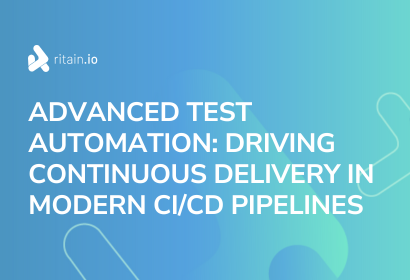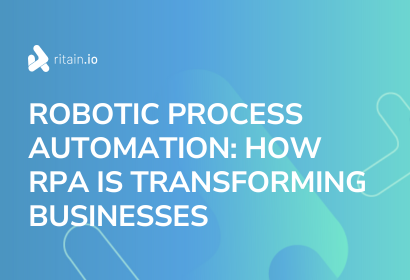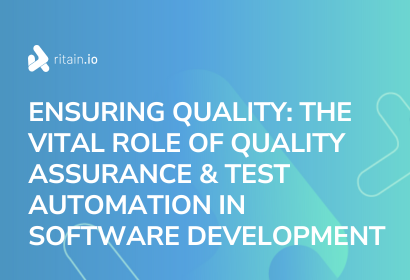BLOGS AND INSIGHTS:
HOW AI AND GENERATIVE TOOLS ARE SUPERCHARGING SOFTWARE DEVELOPMENT
The integration of Artificial Intelligence (AI) and generative tools into software development and testing has revolutionized the industry, enhancing efficiency, accuracy, and speed. As the technological landscape evolves, Ritain.io leverages these advancements to offer superior Quality Assurance (QA) and Automation services.
These tools facilitate better collaboration among development teams by standardizing coding practices and ensuring consistency across projects. This collaborative efficiency further accelerates development timelines and fosters a more agile and responsive development environment.
In this article, we will explore the significant roles AI and generative tools play in development and testing tasks and how Ritain.io is at the forefront of this transformation.
AI in code generation and automated testing with AI
AI is revolutionizing code generation by assisting developers in writing clean, efficient code. Tools like GitHub Copilot and OpenAI Codex leverage machine learning to provide intelligent code suggestions, generate entire functions, and offer documentation based on context.
These AI-powered tools learn from vast code repositories, understanding coding patterns and detecting potential issues in real-time. This automation not only accelerates the development process but also reduces errors and ensures consistency across projects, allowing developers to focus on more complex and creative aspects of their work.
In automated testing, AI significantly enhances the generation, execution, and maintenance of test cases. Traditional automated testing relied heavily on predefined scripts and manual interventions, which could be time-consuming and error-prone. AI-driven tools like this bring a new level of intelligence and adaptability to the testing process. They create comprehensive test scenarios based on code analysis and user behavior, prioritize the most impactful tests, and automatically update and refactor test cases to align with code changes. This reduces the manual effort required, ensures thorough testing coverage, and improves the accuracy and efficiency of the testing process.
Generative tools for test data creation, AI in bug detection and resolution, and performance testing with AI
Generating realistic test data is crucial for effective testing, as it ensures that software behaves correctly under various conditions. Generative tools leverage AI to create diverse data sets that mimic real-world scenarios, providing comprehensive testing coverage. These tools automate the creation of complex data, saving significant time and resources. Key benefits of generative tools include:
- Diverse Data Sets: Generative tools produce a wide range of test data, including edge cases and unexpected user inputs, to thoroughly test software functionality.
- Realistic Scenarios: By simulating real-world conditions, these tools help identify potential issues that might not be apparent with manually created test data.
- Efficiency: Automating test data creation accelerates the testing process, allowing teams to focus on other critical tasks.
AI in bug detection and resolution
AI algorithms enhance bug detection and resolution by identifying patterns and predicting potential issues in the code. Automated debugging tools leverage these algorithms to pinpoint bugs and suggest fixes, significantly reducing the time spent on manual debugging. This leads to faster issue resolution and higher code quality. Key advantages of AI in bug detection and resolution include:
- Pattern recognition: AI analyzes code to detect common bug patterns and predict where issues are likely to occur.
- Automated debugging: Tools like DeepCode and Snyk automatically identify and resolve bugs, providing developers with actionable insights and fixes.
- Efficiency: By streamlining the debugging process, AI reduces the time and effort required to maintain code quality, allowing for quicker development cycles and more reliable software.
Integrating generative tools for test data creation and AI-driven bug detection and resolution into development workflows enhances efficiency and code quality. These technologies ensure comprehensive testing and rapid issue resolution, leading to more robust and reliable software solutions.
Performance testing with AI
AI significantly enhances performance testing by providing intelligent analysis and optimization through various capabilities:
- Improved testing efficiency: AI automates the creation and execution of performance tests, making it faster and more efficient to identify potential issues.
- Load testing and optimization: AI-driven load testing tools, such as Apache JMeter and LoadRunner, simulate high-traffic scenarios to test how software performs under stress. These tools analyze system responses and provide insights for optimization, ensuring that applications can handle peak loads without compromising performance.
- Early identification of bottlenecks: AI excels at identifying performance bottlenecks early in the development cycle. By continuously monitoring and analyzing performance metrics, AI tools can detect anomalies and provide actionable recommendations for improvement, helping teams address issues before they impact end-users.
Ritain.io’s approach to AI and automation in QA
Here at Ritain.io, we leverage AI and generative tools to provide state-of-the-art Quality Assurance (QA) and Automation services, ensuring superior software quality and performance for its clients. We offer a comprehensive suite of QA services, including functional testing, performance testing, security testing, and test automation. By integrating AI into these services, Ritain.io enhances the accuracy and efficiency of testing processes, enabling faster and more reliable software delivery.
The integration of AI and generative tools is a cornerstone of Ritain.io’s approach. We use AI-driven tools for automated code generation, test data creation, bug detection, and performance testing. These tools accelerate development and testing workflows, reducing manual effort and improving overall software quality. By automating repetitive tasks and providing intelligent insights, Ritain.io helps development teams focus on innovation and complex problem-solving.
Conclusion: Future trends in AI and generative tools, emerging technologies, and how Ritain.io plans to staying ahead
Emerging technologies in AI and generative tools will continue to revolutionize software development and testing. Innovations like advanced machine learning, natural language processing, and sophisticated generative models promise to automate complex tasks, predict and mitigate risks with greater accuracy, and seamlessly integrate AI throughout the software lifecycle.
The future of AI in software development and testing includes enhanced CI/CD pipelines managed by AI, and tools capable of understanding and generating code across multiple programming languages. These advancements will further simplify development processes and improve software quality. AI-driven analytics will also provide deeper insights into user behavior and system performance, enabling more proactive and informed decision-making.
Ritain.io is dedicated to staying ahead of these trends by investing in research and development, monitoring industry advancements, and partnering with leading technology providers. This commitment ensures that we remain at the forefront of AI-driven transformation, delivering exceptional QA and Automation services that help clients achieve their development goals efficiently and effectively.
NEWSLETTER
SUBSCRIBE TO OUR NEWSLETTER
Sing up to receive our most recent use cases, blogs and insights.
PROOF OF SUCCESS
Check our
Blogs and News
Ritain.io: Behind the recognition – What makes us one of the best companies to work for
BLOGS AND INSIGHTS:RITAIN.IO: BEHIND THE RECOGNITION – WHAT MAKES US ONE OF THE BEST COMPANIES TO WORK FORRitain.io has proudly been named one of the Best Companies to Work For by EXAME magazine and ManpowerGroup Portugal. This recognition is a testament to our...
OCI Resource Scheduler: Complete Guide for Implementation
BLOGS AND INSIGHTS:ORACLE CLOUD INFRASTRUCTURE (OCI) RESOURCE SCHEDULER: COMPLETE GUIDE FOR IMPLEMENTATIONWhat is OCI Resource Scheduler for? The OCI Resource Scheduler is a cloud-native service provided by Oracle Cloud Infrastructure (OCI) to automate the...













